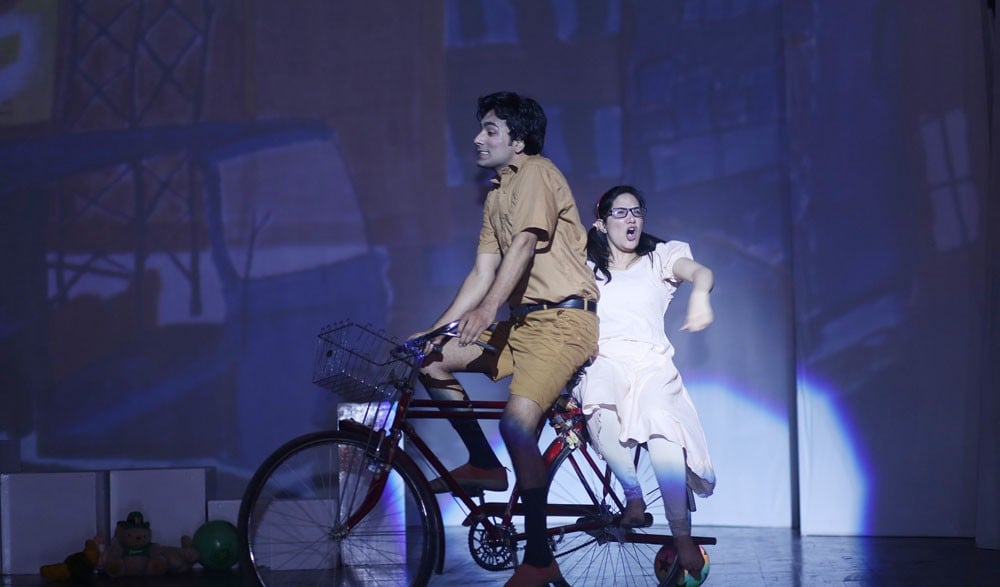
The recently concluded Tamasha Festival 2017 turned out to be three days packed with performing arts events "for young audience"

Last week, Alhamra Arts Council hosted Tamasha Festival 2017, a three-day mega event that packed quite a variety -- arts workshops, theatrical performances, panel discussions et al.
The festival attracted great media attention by virtue of it being young-specific. It was a project of ASSITEJ, an international NGO that works to unite theatres, associations, and individuals around the world who make theatre for children and youth. In Pakistan, it had collaborated with The Little Art, Maas Foundation, Independent Theatre Pakistan, and Chota Mota Theatre. The result was 8 theatre plays, 21 performances by school groups, and 10 interactive workshops on subjects related to dance, theatre and music. The workshops were conducted by international trainers for local artists, students, theatre practitioners, and educators, while the discussion sessions were held for general public.
The opening ceremony was attended by special guests -- all renowned people in their respective fields -- such as classical dancer Bina Jawwad, eminent playwright Asghar Nadeem Syed, and art academic and social activist Salima Hashmi.
Speaking on the occasion, Syed said that he was proud to be a part of The Little Art. "I am very pleased to see that [other such] organisations are coming together to create initiatives for children in our country."
Festival Manager Umair Mushtaq stated the idea behind Tamasha, "…to bring people together on a platform where they can share ideas with the young, and help them develop, so that they can take similar initiatives forward."
One highlight of the festival was a workshop, titled ‘Telling Stories by Dialogue.’ It was conducted by Reihaneh Youzbashi Dizaji, a German delegate. It focused on the importance of dialogue in theatre performances, and provided guidelines to turning written words into live presentations.
Read also: What’s in a Nim…
The instructor herself was very involved with people during the two-hour workshop. She began with an introduction of every individual, followed by warm-up activities, eventually leading to the actual exercise.
For the activity, the participants were made to access a few postcards consisting of images of random objects such as a hat placed on shoes, a single plate on a stand, a pair of scissors shaped as a bird, and an old red box. Each participant was later asked to write a story with reference to the images they had been shown, in a course of 20 minutes. Later, a few of the stories were read out loud. Besides, the participants were asked to turn their stories into dialogues which were to be enacted.
Although the workshop was originally meant for children, one saw a number of adults around. But the way it had been designed, the workshop appealed to people of all ages. Every individual ended up with a better understanding of dialogue-writing and its importance in storytelling and story-presentation.
One amazing thing about the workshop was the participation of little girls from a welfare school from outside Lahore. The young ones were accompanied by their school principal. The festival had afforded them a chance to travel down for the very first time. As 10 years old Noor told TNS, "I’m very excited to be a part of the workshop. I got to participate in other events [at the festival] also, which gave me a chance to interact with foreigner experts. It has boosted my confidence to a new level."
Read also: Not just music & lyrics
Dizaji also expressed a sense of satisfaction at the way the event was going on. She said that she had received a very positive energy from everyone associated with the festival.
Other key workshops by international delegates included ‘Interpreting Poetry as Dramatic Performance’ by Faraz Alee from UAE, ‘Wide Open Window’ by Sue Giles from Australia, and ‘Creative Dance Theatre’ by Nadeeka Tharangani from Sri Lanka.
The presentation by the Sri Lankan group stood out for its theme of a post-war future scenario. It was based on the traditional dance form of Thala, and had the audience mesmerised.